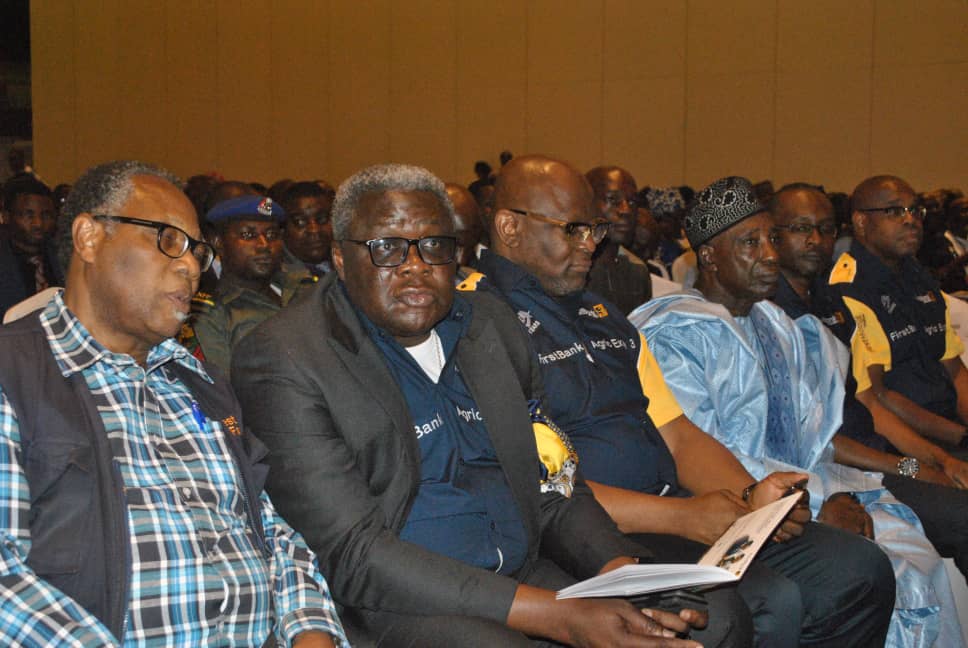…As Lagos aims to revamp agriculture through SPAAG
The federal government has commenced the process of partial privatization of the Nigeria Commodity Exchange with a view to repositioning it for effective service delivery.
The Minister of Industry, Trade and Investment, Otunba Adeniyi Adebayo who disclosed this in his goodwill message to the FirstBank 2019 Agric Expo organized in Lagos on Friday by First Bank of Nigeria Limited stated that the privatization process of the exchange when completed would support in creating of a robust electronic trading platform for agric commodity traders and farmers.
The Minister who spoke through a representative observed that the exchange would also in collaboration with the Nigeria Commodity Marketing Company which he said was being promoted by the 19 Northern states and other investors under Public Private Partnership (PPP) arrangement to engage in the business of agricultural commodity administration and marketing in Nigeria.
This the Minister said would strengthen supply, sale and support record of effective linkage with agro-processing.
He said,” The exchange can emplace effective warehousing regime mechanism to ensure that farmers and other actors in the agricultural commodity value chain remain strong and active in the agricultural production, processing and marketing.”
Otunba Adebayo added that the Ministry was working in collaboration with other quality regulatory agencies to develop standard quality infrastructure in order to curb the spate of rejection of Nigeria’s agricultural commodity export at the international market.
“The agricultural commodity sector, no doubt is gaining unprecedented attention from the federal government and it is highly commendable that First Bank is supporting the government efforts in this regard.
“It is with a view to creating effective linkage between agro-commodity and industry that the federal government through the Federal Ministry of Industry, Trade and Investment put in place an initiative called Nigerian Agribusiness and Agro-industrial Investment Development Initiative (NAADIN).
“The initiative is focused on ensuring that Nigerian quality agricultural products are produced for the domestic and international market thereby creating a robust business for the agricultural commodity sector. Good enough, state governors are partners in driving this local initiative. So far, Sokoto, Akwa Ibom, Imo and Kano states are actively involved while six more states have been earmarked for commissioning before the end of the year”, he noted.
On his part, the Lagos State Governor, Babajide Sanwo-Olu informed that his administration’s agricultural development plan was focused extensively on harnessing the full potentials of the value chain as an integral part of fourth pillar of their development agenda aimed at making Lagos state a 21st century economy.
Represented by the Commissioner for Agriculture, Gbolahan Lawal, Sanwo-Olu declared that the policy objective of his administration which was to ensure that the state was food secured was anchored on a Strategic Programme on Accelerated Agricultural Growth (SPAAG).
“Under this programme, we have revamp the present status of food crops production, livestock production, increase value addition and employment opportunities for women and youths including those living with disability through agricultural value chain especially where the state has comparative and competitive advantage like aqua culture, livestock, vegetable, rice and agro processing.
“We also established more partnership, construct or rehabilitate farm access roads, provide farm inputs while also introducing agro processing and packaging techniques. Furthermore, we are currently one of the six states participating in the World Bank Assisted project. This project will assist small farm holders especially women and youths on target areas including poultry, rice processing and agro processing among others”, he stated.
He however advised that it was the collective responsibility of government and all stakeholders in the economy of the state and Nigeria in general that can make the country achieve the desired development in the agric sector.
He continued, “As citizens, they have the responsibility to support government policy by taking a decision to eat what we grow and produce. On our part, we will continue to provide the enabling environment for active participation of the private sector in agricultural value chain as a strategy to achieve food security, job creation and increase contribution of the non-oil sector to the Gross Domestic products.”
Photo: (From left); Vice President, Nigeria Agric, Business Group, Mr Emmanuel Ijewere; Director Corporate Banking, First Bank Nigeria Limited, Mr. Remi Oni; CEO, First Bank Nigeria Limited, Dr Adesola Adeduntan; Minister of Agriculture and Rural Development, Alhaji Mohammed Sabo Nanono; Executive Director, Public Sector First Bank, Mr. Abdullahi Ibrahim; Deputy Managing Director, First Bank Nigeria, Mr Gbenga Shobo, , during the 2019 First Bank Agric Expo on Agriculture Value Chain Spotlighting Opportunities and Managing Risk in Lagos on Friday. PHOTO SUNDAY ESHIET.
Send your news, press releases/articles to augustinenwadinamuo@yahoo.com. Also, follow us on Twitter @ptreporters and on Facebook on facebook.com/primetimereporters or call the editor on 07030661526, 08053908817.

